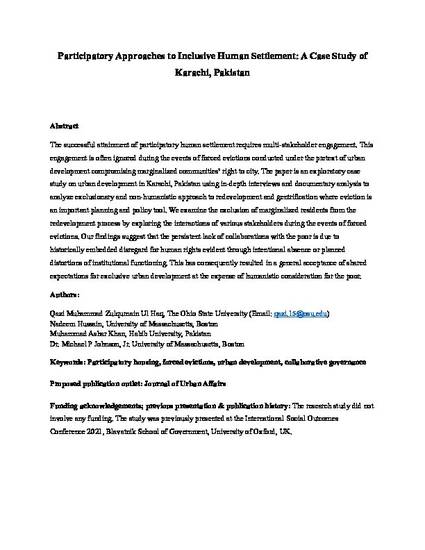
Unpublished Paper
Participatory Approaches to Inclusive Human Settlement: A Case Study of Karachi, Pakistan
(2024)
Abstract
The successful attainment of participatory human settlement requires multi-stakeholder engagement. This engagement is often ignored during the events of forced evictions conducted under the pretext of urban development compromising marginalized communities’ right to city. The paper is an exploratory case study on urban development in Karachi, Pakistan using in-depth interviews and documentary analysis to analyze exclusionary and non-humanistic approach to redevelopment and gentrification where eviction is an important planning and policy tool. We examine the exclusion of marginalized residents from the redevelopment process by exploring the interactions of various stakeholders during the events of forced evictions. Our findings suggest that the persistent lack of collaborations with the poor is due to historically embedded disregard for human rights evident through intentional absence or planned distortions of institutional functioning. This has consequently resulted in a general acceptance of shared expectations for exclusive urban development at the expense of humanistic consideration for the poor.
Keywords
- Participatory housing,
- forced evictions,
- urban development,
- collaborative governance
Disciplines
Publication Date
July 1, 2024
Comments
Under review at Journal of Urban Affairs
Citation Information
Qazi M. Z. Ul Haq, Nadeem Hussein, Muhammad Ashar Khan and Michael P Johnson. "Participatory Approaches to Inclusive Human Settlement: A Case Study of Karachi, Pakistan" (2024) Available at: http://works.bepress.com/michael_johnson/146/
